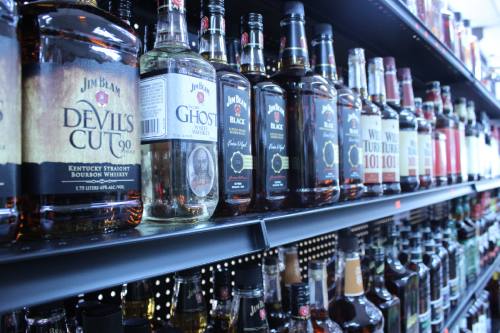 Source: city of Pearland/Community Impact Newspaper[/caption]
Source: city of Pearland/Community Impact Newspaper[/caption]
Pearland voters overwhelmingly supported a ballot measure to lift the prohibition on liquor stores during the Nov. 8 general election.
The ballot measure, called a local option election, was approved by 66 percent of voters and allows for the sale of alcohol for off-premises consumption only, which would include establishments like liquor stores.
Although liquor stores are legally permitted to move into Pearland following the election, city council approved zoning restrictions during a meeting in late October that would limit where liquor stores can open within city limits.
“I think it would be irresponsible of us to not pass the ordinance given that the voters approved the liquor sales,” said Pearland City Council member Gregg Hill. “Had we not passed the ordinance liquor stores could go anywhere where they’re allowed by right.”
In the wake of the local option election passed, about 10 interested parties have approached the city about opening a liquor store, Hill said.
In addition to geographic limitations, liquor stores would be subject to conditional-use permits, also known as CUPs. By subjecting liquor stores to CUPs, city council can review each application individually and impose conditions when necessary.
Each piece of property in Pearland is zoned to a specific “use”, like commercial, residential, industrial, etc. Typically, as long as a property owner or buyer aligns their project to the zoned use, then a permit is issued. When faced with a CUP, a landowner or potential buyer could face restrictions or conditions from the city prior to it issuing a permit.
“There is no specific list of conditions for a liquor store. The whole process is it’s a public hearing process,” said Lata Krishnarao, director of community development for Pearland. “If the council feels there needs to be additional conditions to ensure compatibility with adjoining users, they could approve a conditional-use permit subject to those conditions.”
Gas stations, pawnshops, gold exchanges, payday loan stores, cigar shops and other establishments require CUPs too, according to the city’s unified development code.
The city zoned all liquor store developments to properties zoned for general commercial, general business, light industrial and the Business Park District-288, which are all nonresidential sites.
However, some properties zoned general business and general commercial are in close proximity to homes, schools and churches, according to the city’s zoning map. Council members reserve the right to deny CUPs.
“It’s not allowed unless we approve it, and that gives us an opportunity to determine how we want to build and shape our city,” Hill said.
The city council holds joint public hearings prior to approving any CUP to hear feedback from property owners, buyers and any residents who would be impacted by the sale. Neighboring property owners within 200 feet of the proposed development are notified by the city of the public hearing.
“Neighborhood input is very important to the council. That is why it is a joint public hearing process,” Krishnarao said.
The November local option is not the first time Pearland residents voted to loosen liquor restrictions. In 2007, residents in Brazoria County elected to allow beer and wine sales for off-premises consumption, such as in grocery stores, as well as mixed-beverage sales in restaurants, according to the Texas Alcoholic Beverage Commission.
The Pearland Chamber of Commerce hired a consultant to place the 2007 local option election on the ballot.
Pearland still prohibits bars and other establishments that earn most of their revenues from alcohol sales from opening within city limits.




